Businesses use pallets for different reasons and for different lengths of times. Some are just for storing goods such as in warehouse pallet storage systems, while others are a way of moving things around. Once they are finished with, they can often be reused, and there are companies in the US that will take them off your hands. It is estimated that over 70% of pallets are recycled in America and that amounts to a lot of trees being saved.
Reusable Pallets
Not all pallets are in a good enough condition to be reused, but some are. They can be collected from your premises, with as few as 100 or a truckload being picked up.
Other pallet users in the US sometimes have a home for them, and sometimes they are heat treated for export to other countries.
The purpose of heat treatment when recycling pallets is to kill any bugs and living organisms so the wood does not carry any sicknesses or diseases to the country the pallets are being exported to. They have to be stamped to show they comply with the International Plant Protection Convention or they will not be allowed to be transported abroad. The alternative is fumigation with methyl bromide, but most companies opt for the heat treatment way.
Non-Reusable Pallets
Not all pallets are reusable. Some are damaged too much, and others are just too old, so not as safe as they once were. The wood from them can be recycled though and used in many different ways. Often the damaged pallets or wood from them is ground into animal bedding, boiler fuel, bark mulch or some other product. Very cleverly, at the end of the grinding belt there is a magnet that extracts any nails and screws.
Not every pallet company will go to this extent as it is not a very profitable sideline, but environmentally friendly ones will not just burn or dispose of the wood from damaged pallets.
They will make use of it.
Plastic Pallets
In comparison to wooden ones, plastic pallets are a fairly new innovation. They are very durable and because they are waterproof, they are easily cleaned. Plastic will not give splinters like wood pallets can, and unless they are heavily damaged, perhaps by being overloaded, they can be recycled several times without any problems.
The two main disadvantages of using plastic pallets is that if you want them from new, they are generally made to order so you could have to wait for up to a month for their delivery. The other problem is their cost, as they do tend to be more expensive than wooden pallets unless you are buying a very large amount of them.
Whatever the pallets you have are made of, if you have finished with them, it makes sense to arrange for them to be recycled. This not only helps you get them out your way, but it helps reduce waste and as with all recycling, it is good for the planet.


